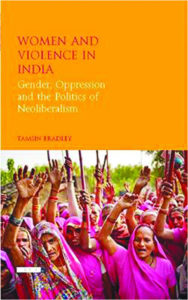
Women and Violence in India: Gender, Oppression and the Politics of Neoliberalism
Tamsin Bradley
I.B.Tauris & Co. Ltd. (2017)
£69
India’s endemic gender-based violence has received increased international scrutiny and provoked waves of domestic protest and activism. In recent years, related studies on India and South Asia have proliferated but their analyses often fail to identify why violence flourishes. Unwilling to simply accept patriarchy as the answer, Tamsin Bradley presents new research examining how different groups in India conceptualise violence against women, revealing beliefs around religion, caste and gender that render aggression socially acceptable. She also analyses the role that neoliberalism, and its corollary consumerism, play in reducing women to commodity objects for barter or exchange. Unpacking varied conservative, liberal and neoliberal ideologies active in India today, Bradley argues that they can converge unexpectedly to normalise violence against women. Due to these complex and overlapping factors, rates of violence against women in India have actually increased despite decades of feminist campaigning.
This book will be crucial to those studying Indian gender politics and violence, but also presents new data and methodologies which have practical implications for researchers and policymakers worldwide.
Tamsin Bradley is Senior Lecturer in International Development Studies at the University of Portsmouth. Her previous books include Gender and Religion in Developing Societies: Faith-based Organisations and Feminism in India (I.B.Tauris, 2010) and Challenging the NGOs: Women, Religion and Western Dialogues in India (I.B.Tauris, 2006).
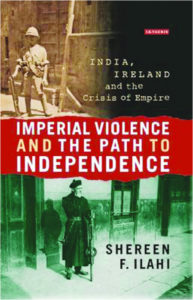
Imperial Violence and the Path to Independence: India, Ireland and the Crisis of Empire
Shereen Ilahi
I.B.Tauris & Co. Ltd. (2016)
£64
In the aftermath of World War I, the British Empire was hit by two different crises on opposite sides of the world—the Jallianwala Bagh, or Amritsar, Massacre in the Punjab and the Croke Park Massacre, the first ‘Bloody Sunday’, in Ireland. This book provides a study at the cutting edge of British imperial historiography, concentrating on British imperial violence and the concept of collective punishment.
This was the ‘crisis of empire’ following the political and ideological watershed of World War I. The British Empire had reached its greatest geographical extent, appeared powerful, liberal, humane and broadly sympathetic to gradual progress to responsible self-government. Yet the empire was faced with existential threats to its survival with demands for decolonisation, especially in India and Ireland, growing anti-imperialism at home, virtual bankruptcy and domestic social and economic unrest.
Providing an original and closely-researched analysis of imperial violence in the aftermath of World War I, this book will be essential reading for historians of empire, South Asia and Ireland.
Shereen F. Ilahi is Associate Professor of History at North Central College, Illinois. She holds a PhD from the University of Texas at Austin.
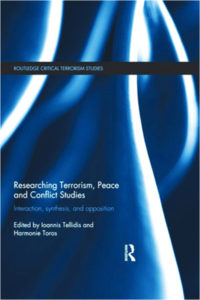
Researching Terrorism, Peace and Conflict Studies: Interaction, Synthesis and Opposition
Edited by Ioannis Tellidis, Harmonie Toros
Routledge (2015), £90
This book examines potential synergies between the fields of Terrorism Studies and Peace and Conflict Studies.
The volume presents theoretically- and empirically-informed contributions, which shed light on whether the two fields can inform each other on issues of mutual interest and importance. The book examines key themes including the conceptualisation(s) of peace and violence; the exceptionalisation of terrorist violence; the relationship between scholarship and political power; the dysfunctionality of the liberal peace and the opportunities offered by post-liberal peacebuilding frameworks; and the implications and challenges of cyber-terrorism and cyber-conflict. Furthermore, the book intends to be a launching pad for future debate on whether the recent ‘critical’ turn in terrorism studies can offer a pathway for peace studies to engage with the so far largely ignored question of power.
Consisting of not only key scholars but also practitioners and policy makers, the contributors present a number of case studies, including Colombia, Northern Ireland, the Basque Country, and Iraq, where they explore the relationships between terrorism and peace and conflict approaches. They critically analyse the statist approach inherent in both terrorism approaches and liberal peacebuilding frameworks; the role of the grassroots levels of society; the inefficiency of simplistic frameworks of understanding and implementation; and the chains of governance from international (and transnational) actors to national actors and finally from national to local actors.
This book will be of much interest to students of terrorism studies, peace and conflict studies, IR and security studies.
Ioannis Tellidis is Assistant Professor of International Relations, College of International Studies, Kyung Hee University, South Korea, and assistant editor of the journal Peacebuilding.
Harmonie Toros is a lecturer in International Conflict Analysis and at the University of Kent, UK, and is author of Terrorism, Talking and Transformation (Routledge 2012).
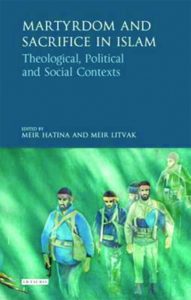
Martyrdom and Sacrifice in Islam: Theological, Political and Social Contexts
Meir Hatina
I.B.Tauris & Co. Ltd. (2016)
£69
Over the years, the belief system around self sacrifice has become key to understanding the Middle East and its political relationships with the West although much of the literature and conversation has been restricted to modern concepts of jihadism. The recent spate of scholarship relating to suicide bombers and jihadists studies these concepts without a broader understanding of the principle of martyrdom.
This book expands on the chronology of self-sacrifice within Islam and contextualises the use of suicide bombings using details of the rise of martyrdom in places such as Iraq, Lebanon, Chechnya and Pakistan. It historicises the background in which ‘jihad’ has been glorified while also exploring contemporary methods of recruitment, like the use of the internet.
The authors pay close attention to the different sects and factions of Islam and the differing interpretations of jihad that accompany these ideologies. In the current political climate, a book that explores martyrdom within the framework of historical perspectives, geographical regions and the influence of outside cultures is essential.
Meir Hatina is Associate Professor of Islamic and Middle Eastern Studies at The Hebrew University, Jerusalem. He is also the Director of The Nehemia Levtzion Center of Islamic Studies at the same university.
Meir Litvak is the Director of the Center for Iranian Studies at Tel Aviv University and an Associate Professor in the Department of Middle Eastern and African History at the same university. He holds a PhD from Harvard University.
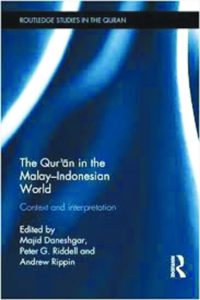
The Qur’an in the Malay-Indonesian World: Context and Interpretation
Majid Daneshgar, Peter G. Riddell, Andrew Rippin
Routledge (2016)
£90
The largely Arabo-centric approach to the academic study of tafsir has resulted in a lack of literature exploring the diversity of Qur’anic interpretation in other areas of the Muslim-majority world.
The essays in The Qur’an in the Malay-Indonesian World resolve this, aiming to expand our knowledge of tafsir and its history in the Malay-Indonesian world. Highlighting the scope of Qur’anic interpretation in the Malay world in its various vernaculars, it also contextualizes this work to reveal its place as part of the wider Islamic world, especially through its connections to the Arab world, and demonstrates the strength of these connections. The volume is divided into three parts written primarily by scholars from Malaysia and Indonesia. Beginning with a historical overview, it then moves into chapters with a more specifically regional focus to conclude with a thematic approach by looking at topics of some controversy in the broader world.
Presenting new examinations of an under-researched topic, this book will be of interest to students and scholars of Islamic studies and Southeast Asian studies.
“The books is very rich in information and it is therefore fortunate that the work ends with an index, not only containing personal names, but also the names of organizations, books, and some concepts. To specialists who follow developments in Qur’an interpretation in the Malay-Indonesian world, the present book contains a lot of materials which is familiar and have been dealt with in previous studies, but it definitely has also new things to offer. For beginning students who want to familiarize themselves with tafsir in the Malay-Indonesian world the present book is an excellent starting point.” (Nico J.G. Kaptein, Leiden University, Journal of the Humanities and Social Sciences of Southeast Asia).
“…the volume is a good introduction to opening up new vistas of research into what the Qur’an means to the Malay-Indonesian world and the contributors are to be congratulated for their commendable effort.” (Mohamad Nasrin Nasir, National University Malaysia, The Muslim World Book Review).
Majid Daneshgar is Lecturer in Islamic Studies at the University of Otago, New Zealand. His research focuses on Islam in the Malay-Indonesian World, and Islam and Science in the 19th and early 20th Centuries.
Peter G. Riddell is Vice Principal (Academic) at the Melbourne School of Theology and Professorial Research Associate in History at SOAS, the University of London. He has published widely on the study of Southeast Asia, Islam and Christian-Muslim Relations.
Andrew Rippin is Professor Emeritus of Islamic history at the University of Victoria, Canada and Senior Research Fellow of Qur’anic studies at the Institute of Ismaili Studies, London.

